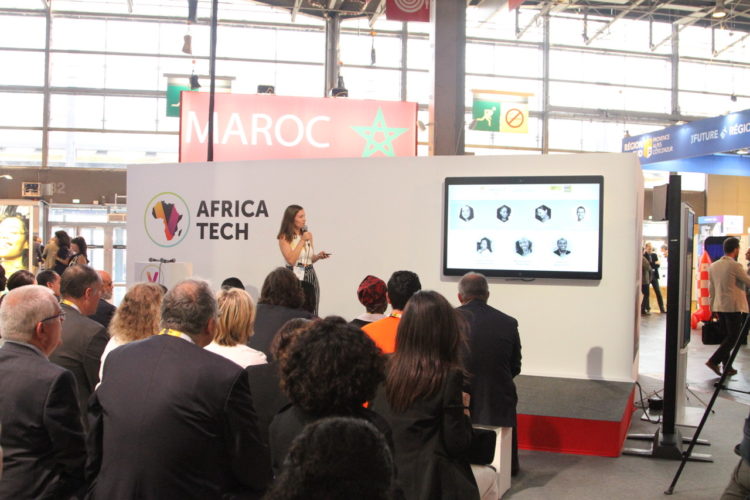Of the ten startups selected by the French pharmaceuticals giant SANOFI for their Afric@Tech e-health challenge, YAPILI stood out because of the friendly way its app connects patients to doctors in Africa and elsewhere. We spoke with YAPILI’s twenty-something Canadian founder Enya Seguin, about why Africa needs this particular online health platform.
How did you come up with the idea of YAPILI?
The concept of YAPILI was born in November 2014 by a group of four young entrepreneurs who met in East Africa through the startup incubator called Ampion. The theme of the East African incubator was mHealth. YAPILI was raised as part of various core philosophies developed by the team and by the context of ‘changing times’ for both technological and healthcare development. While the dialogue concerning other industries, such as agritech and fintech, were gravitating towards user-centred visions grouped with a massive interest for innovation, healthcare has remained untouched for some time. It can be said that this is due to the inherent sensitive nature of health and care. That is not to say that healthcare is a stagnant industry. On the contrary, medical research has proved to be a hugely innovative sector since the dawn of time. However, in practice the ‘care’ part of healthcare requires a much needed revamp especially in emerging markets where the double burden of diseases is rapidly growing.
Essentially, YAPILI was born with empowerment as its culture. Our objective is to empower the micro to the macro levels of healthcare in emerging markets; from the individual, to the community, to the national system level. This is why YAPILI means ‘second option’ in Swahili. We aim to provide an alternative solution for people to obtain reliable and confidential access to healthcare. We aim to strengthen the existing structures that exist locally.
4 years after YAPILI was born as a concept, and 1 year after our official launch into 8 African countries, our team has grown to 12 people from 8 countries, covering top-tier expertise in tech development, medical practice, healthcare policy, business development and market activation.
Please share one YAPILI success story and one failure with us.
A significant portion of our success story will always rely on the social impact we are having as a social enterprise. The impact consists of connecting users seeking health advice from 8 African countries to health professionals located in Europe, Asia and Africa. We are providing a solution for individuals and families to have access to reliable and confidential access to health advice from the comfort of their mobile device. That is our biggest success story yet.
We do not see any challenge as a failure since we have been able to grow from every experience. An aspect that has slowed us down in the past year is the common ‘chicken & egg’ problem. Almost every startup has encountered this in its own way. We launched a functional service able to connect users to advisers on our app and online. The product we launched was an MVP (minimum viable product) and pilot project. Of course our product roadmap goes way beyond establishing a telemedicine connection but we need more partnerships and funding to do so. In times of high speed discussions with dozens of potential partners and investors, it can be challenging to remember and acknowledge your accomplishments because you are constantly talking about future projections. What is important to remember is what we achieved with minimum funding from crowdsourcing, grants and own resources.
YAPILI is actively connecting users from African countries to doctors anywhere in the world. And let’s also remember – zero salaries have been provided to our team and 3 babies have been delivered. That’s an accomplishment.
Whereby investors want to see that your product is generating revenue, we believe that our product must evolve in order to move beyond the free pilot and request subscription fees. To bring our product to the next level, we need funding. This is the chicken & egg situation.
Where do you see the company going from here?
Access to connectivity is increasing rapidly across the African continent. In Sub-Saharan Africa, mobile phone subscribers reached 44% of the population in 2017. Various factors have contributed to this phenomenon including the declining cost of smartphones. Kenya had 30,000 internet users in 2000. In 2017, it was estimated that Kenya had approximately 43 million internet users. Botswana, with a population of 2 million people, had around 1 million internet users in 2017. These developments in many African countries have given way to to vast socioeconomic progress. The increased access and agility towards smartphones and connectivity present a new opportunity for healthcare. Access to Internet has grown faster than access to healthcare. That’s where YAPILI comes in. We are enabling users to access their medical information from the comfort of their phones. We are enabling users to access medical professionals and specialists from the comfort of their homes. From here, our user-base is growing which means our sample size for data collection is growing too. YAPILI is creating a user interface whereby we are collecting real-time anonymised and aggregated data to eventually improve health analytics and big data in Africa. Stay tuned!

